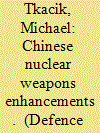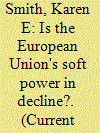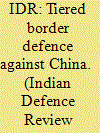| Srl | Item |
| 1 |
ID:
129957


|
|
|
|
|
| Publication |
2014.
|
| Summary/Abstract |
Mainstream analysis of China's nuclear weapons program sees the current buildup as restrained and driven by American counterforce capabilities (both conventional and nuclear). This reflects an assumption by such analysts that PRC strategists share assumptions with Western analysts about the disutility of nuclear weapons. This manuscript presents an alternative interpretation of China's current nuclear modernization. The article examines the capabilities being acquired by the PRC, including rapid response, MIRVs, and highly survivable delivery systems. The paper argues it is equally plausible that China seeks warfighting capabilities and that will be useful in political coercion as it transitions to an international hegemon.
|
|
|
|
|
|
|
|
|
|
|
|
|
|
|
|
| 2 |
ID:
129208


|
|
|
|
|
| Publication |
2014.
|
| Summary/Abstract |
Almost twenty-five years ago, the political scientist Joseph S. Nye Jr. coined the term "soft power" to capture the influence that the United States exercises not through coercion or inducement but through attraction. Coercion and inducement-the stick and the carrot-are forms of command power (or what Nye calls "hard power"), delivered via economic, diplomatic, or military instruments. Command power is used to compel or bribe others to do what you want them to do. Soft power, in contrast, is less a policy instrument to be wielded than an indirect force; it emanates from the attractiveness of a state's culture, political values, and foreign policies. Soft power encourages other international actors to cooperate with a state (or a multistate organization like the European Union) to pursue what they perceive as shared goals and values. It is therefore a less costly means of attaining desired outcomes than the use of command power.
|
|
|
|
|
|
|
|
|
|
|
|
|
|
|
|
| 3 |
ID:
130095


|
|
|
|
|
| Publication |
2014.
|
| Summary/Abstract |
On balance, the prospects of Sino-Indian conflict remain. What appears certain is that China's aggressive stance and the initiation of conflict will be aimed at undermining India's status as a regional power. It India tails to respond adequately, she will be projected as a 'Soft State' susceptible to coercion. Simultaneously, the Chinese aim would be to keep India embroiled in lighting internal/regional conflicts. In doing so, China may be expected to virtually abrogate any agreements such as Border Peace and Tranquility Agreement and Confidence Building Measures and BDCA leading to incremental build up and conflict.
|
|
|
|
|
|
|
|
|
|
|
|
|
|
|
|